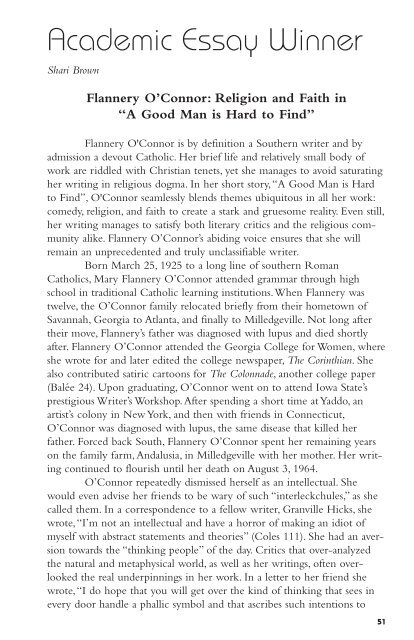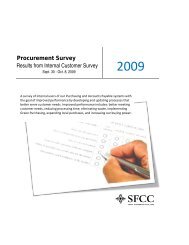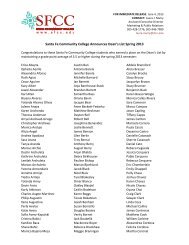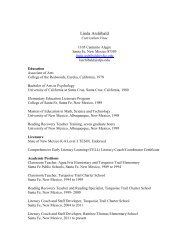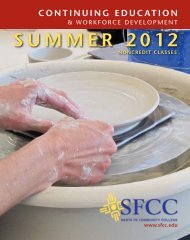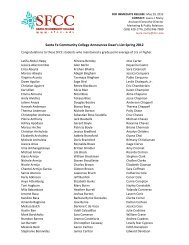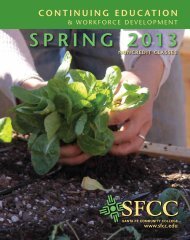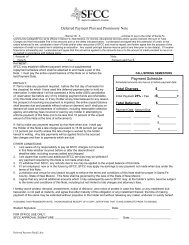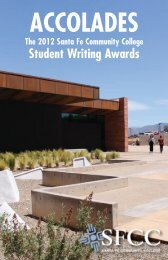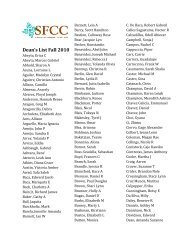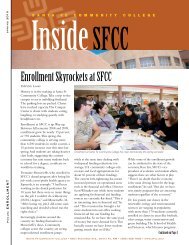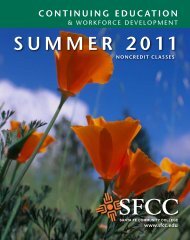2011 Student Writing Awards Booklet - Santa Fe Community College
2011 Student Writing Awards Booklet - Santa Fe Community College
2011 Student Writing Awards Booklet - Santa Fe Community College
You also want an ePaper? Increase the reach of your titles
YUMPU automatically turns print PDFs into web optimized ePapers that Google loves.
Academic Essay Winner<br />
Shari Brown<br />
Flannery O’Connor: Religion and Faith in<br />
“A Good Man is Hard to Find”<br />
Flannery O'Connor is by definition a Southern writer and by<br />
admission a devout Catholic. Her brief life and relatively small body of<br />
work are riddled with Christian tenets, yet she manages to avoid saturating<br />
her writing in religious dogma. In her short story,“A Good Man is Hard<br />
to Find”, O'Connor seamlessly blends themes ubiquitous in all her work:<br />
comedy, religion, and faith to create a stark and gruesome reality. Even still,<br />
her writing manages to satisfy both literary critics and the religious community<br />
alike. Flannery O’Connor’s abiding voice ensures that she will<br />
remain an unprecedented and truly unclassifiable writer.<br />
Born March 25, 1925 to a long line of southern Roman<br />
Catholics, Mary Flannery O’Connor attended grammar through high<br />
school in traditional Catholic learning institutions.When Flannery was<br />
twelve, the O’Connor family relocated briefly from their hometown of<br />
Savannah, Georgia to Atlanta, and finally to Milledgeville. Not long after<br />
their move, Flannery’s father was diagnosed with lupus and died shortly<br />
after. Flannery O’Connor attended the Georgia <strong>College</strong> for Women, where<br />
she wrote for and later edited the college newspaper, The Corinthian. She<br />
also contributed satiric cartoons for The Colonnade, another college paper<br />
(Balée 24). Upon graduating, O’Connor went on to attend Iowa State’s<br />
prestigious Writer’s Workshop. After spending a short time at Yaddo, an<br />
artist’s colony in New York, and then with friends in Connecticut,<br />
O’Connor was diagnosed with lupus, the same disease that killed her<br />
father. Forced back South, Flannery O’Connor spent her remaining years<br />
on the family farm, Andalusia, in Milledgeville with her mother. Her writing<br />
continued to flourish until her death on August 3, 1964.<br />
O’Connor repeatedly dismissed herself as an intellectual. She<br />
would even advise her friends to be wary of such “interleckchules,” as she<br />
called them. In a correspondence to a fellow writer, Granville Hicks, she<br />
wrote,“I’m not an intellectual and have a horror of making an idiot of<br />
myself with abstract statements and theories” (Coles 111). She had an aversion<br />
towards the “thinking people” of the day. Critics that over-analyzed<br />
the natural and metaphysical world, as well as her writings, often overlooked<br />
the real underpinnings in her work. In a letter to her friend she<br />
wrote,“I do hope that you will get over the kind of thinking that sees in<br />
every door handle a phallic symbol and that ascribes such intentions to<br />
51


